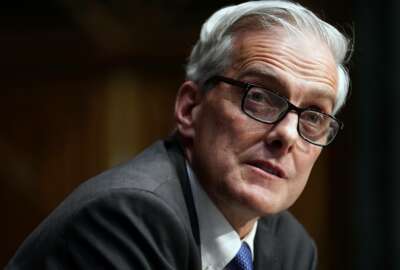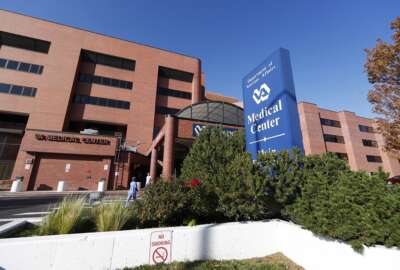Hubbard Radio Washington DC, LLC. All rights reserved. This website is not intended for users located within the European Economic Area.
On Air: Federal News Network
Trending:
VHA tells leaders to rescind job offers only as a ‘last resort’ to manage size of health care workforce
The Veterans Health Administration, in recent memos, put a temporary pause on pulling back job offers, then told leadership and HR officials to only rescind job...
The Department of Veterans Affairs saw record hiring last year. Now it’s looking to manage the size of its largest-ever health care workforce.
The Veterans Health Administration, in recent memos, put a temporary pause on pulling back job offers, then told leadership and HR officials to only rescind job offers as an “action of last resort.”
VA officials stress that the department still plans to keep growing its health care workforce — albeit in specific, targeted areas, and through a smaller net increase of employees.
However, VA health care job applicants say they’re frustrated by delays and are still waiting for final job offers, even in positions that are still in high demand at VHA.
Meanwhile, federal employee union officials say VHA still has urgent hiring needs to reduce the workload on current VA health care employees.
Rescind job offers only as ‘action of last resort’
Assistant Under Secretary for Health for Operations RimaAnn Nelson, in a Jan. 23 memo obtained by Federal News Network, called for a “strategic pause on rescinding job offers” through Jan. 31, 2024.
In a follow-up memo on Feb. 5, Nelson told VHA leaders that “rescission should be an action of last resort because of the adverse impact to our national brand as an employer of choice and the candidate.”
The memo directs VHA leaders to “mitigate unintended impacts that rescinding tentative job offers (TJOs) and final job offers (FJOs) may have on our workforce, our national brand as an employer of choice, and to the candidates themselves.”
“It is strongly recommended that facilities do not rescind any FJOs made and accepted by candidates,” Nelson wrote, adding that “rescissions should only occur after all attempts to place the candidate locally are exhausted.”
The memo also directs VHA to avoid rescinding tentative job offers, if possible, and these decisions should take into consideration the agency’s hiring priorities, which include mental health and ambulatory care.
Nelson sent the memos to the directors of Veterans Integrated Service Networks (VISNs), VA medical center directors and VHA chief HR officers.
“If rescinding FJOs or TJOs cannot be avoided, every effort should be made to refer and potentially place candidates into other eligible positions or other facilities in accordance with applicable master agreements, VA policy, regulation, and statute,” Nelson wrote.
In cases where a job offer has been rescinded, the memos state that VHA’s Workforce Management and Consulting Office (WMC) will take the lead in finding appropriate positions for physicians, advanced practice nurses, physician assistants and psychologists.
VA Press Secretary Terrence Hayes told Federal News Network in a statement Wednesday that “there is not a nationwide hiring freeze or hiring pause, and there are no plans for a hiring freeze or reduction in the VA health care workforce.”
VHA hired more than 61,000 employees in fiscal 2023, its fastest rate of growth in 15 years. The agency grew its total workforce by more than 7%, and now has more than 400,000 employees for the first time in its history.
In addition, efforts to boost retention have led to a 20% decrease in turnover between 2022 and 2023.
Hayes said VHA continues to hire in several key areas — such as mental health care, and in locations that have seen an increase in veterans enrolling in health care — but added that “we believe that we have reached a stage where we have the overall staffing we need to deliver for our nation’s veterans.”
“We are constantly communicating with local VA leaders to make sure that we have the staff we need to best serve our nation’s veterans,” Hayes said. “As such, leaders are empowered to make decisions at the local level about their ongoing hiring actions. If we no longer need to fill a position in a certain location, we will look to place any affected individuals in another position at VA if at all possible.”
‘There is no hiring freeze’
Under Secretary for Health Shereef Elnahal told VHA employees in a Feb. 5 email that, following last year’s record hiring, “we have the nationwide staffing level we need to accomplish this important mission — and we have the funding we need to care for veterans through 2024 and into 2025.”
“As responsible stewards of these funds, we must make thoughtful decisions about resource use at every level of the enterprise,” Elnahal said. “This means that we will not be hiring at the same rate we did last year but let me be clear: there is no hiring freeze, we will continue to hire in key areas, and we will do everything in our power to continue supporting our current workforce.”
VA Secretary Denis McDonough told reporters on Jan. 30 that the Veterans Benefits Administration is still hiring to grow its workforce, but “as it relates to VHA, there may be times when we determine that there are personnel that we don’t need going forward.”
McDonough said he’s been in talks with House and Senate lawmakers about the VA’s ability to grow its workforce to keep up with demand under the PACT Act. He said he expects VHA to manage its headcount as employees retire or leave the agency.
“We think that we can manage this through attrition, and this will be something that we work through,” McDonough said.
‘It feels like a slamming of the brakes’
Mary Jean Burke, the first executive vice president of the American Federation of Government Employees’ National VA Council, said in an interview that she’s heard of at least three VA medical facilities that have recently rescinded final job offers.
Burke said that, even with VHA’s record hiring last year, it remains unclear why VHA is rolling back its hiring goals.
“They’ve claimed, ‘Hey, we did this great hiring, 7% year over year.’ You don’t expect necessarily to go 7% year over year over year. But all of a sudden, it feels like a slamming of the brakes. And maybe they didn’t anticipate that, and I’m not sure about the cause of that,” Burke said.
Hiring needs, she added, vary region by region, but one common element across the VA health care network is talks of budget shortfalls.
“I can tell you in the last month, definitely across the system, messages [were] being sent out like, ‘Hey, we’ve got money problems,’” Burke said. “That is a cause of concern, especially in light of how sudden that must have come upon those medical facilities.”
VHA facilities, she said, still have staffing needs that exceed the agency’s hiring plans for the year.
Burke said she’s heard from bargaining unit employees that clinical nephrologists in Chicago, for example, have been asked to stay on-call for 28 consecutive days.
“It is a concern that we remain a condition of employment that is ideal, instead of like, ‘OK, we’re budget-crunched. Everyone work, and not have time off,'” she said.
VHA job applicants in ‘limbo’
The lengthy hiring process is frustrating job applicants, especially those who have accepted tentative job offers, but have yet to receive a final job offer from VHA.
A VHA job applicant, who requested anonymity to share details of his hiring experience, told Federal News Network that he applied for a VHA mental health peer specialist position in October 2023, and received an interview a month later.
According to documents shared with Federal News Network, he received a tentative job offer, accepted the job offer and completed all onboarding forms in late December.
The job applicant was given a tentative start date for the end of January, but his start date was then pushed back to mid-February. Just days out from the mid-February tentative start date, the applicant still hadn’t received a final job offer, and was still waiting on VHA to complete several onboarding steps.
“They’ve got people’s lives in limbo at this point. And it’s a terrible place to put candidates,” he said. “There’s no idea when I’m going to get an FJO, or if there is an idea, no one’s communicating that with me.”
Despite receiving better-paying job offers in the private sector, the job-seeker said he was prepared to relocate more than five hours for the VHA job he applied for, and was in the process of closing on a house after accepting the VHA tentative job offer.
“I’ve communicated with HR frequently that, look, I’ve got a mortgage waiting on this, and nothing happens. So, it’s extremely frustrating,” he said.
The applicant, a veteran with a master’s degree in social work, said he applied for the VHA mental health peer specialist position because he wanted to help other veterans through their mental health challenges.
“It’s a role where the person has experienced their own mental health issues, and kind of overcome them,” he said, describing the position he applied for. “And you work with other veterans, going through serious mental illnesses, and helping them basically, not to isolate, learn to set goals, learn that whole recovery process.”
The applicant said he kept checking in with VHA for updates, especially after getting another job offer in the private sector that would pay him 20% more.
“I’m definitely not in the field for the money — I want to help veterans, but VHA is making that nearly impossible to do that. Mental healthcare for veterans will suffer as a result of the budgetary, hiring shenanigans that are happening,” he said.
The applicant told Federal News Network on Feb. 10 that he declined the VHA job offer, in favor of the job offer in the private sector.
“They’re just missing qualified candidates, and they’re going to start bleeding qualified candidates, and it’s going to turn around and have an effect, have a negative impact on patient care, on veteran care,” he said.
While VHA is looking to improve the hiring experience for job applicants, the job seeker said that, based on his own experience, he’d recommend candidates like him consider applying for other federal health care jobs.
“You can go to work for the Centers for Disease Control. You go to work for Indian Health Services,” he said. “There’s all these other agencies that could use your talents, other than VHA, because it’s just not happening. They say there’s a need for mental health specialists, and they’re just not showing it,”
VHA seeks faster hiring, better hiring experience
David Perry, VHA’s chief officer for workforce management and consulting, said in a Feb. 2 interview that because of VHA’s record hiring last year, the agency is looking to grow its workforce by about 2% this year — “nowhere close” to the 7% growth it saw last year.
“I think a more strategic focused hiring target is what we’ll see bear out the rest of this year,” Perry said.
That focused hiring target, he added, includes growth in mental health and ambulatory care. Perry also said VHA this year is looking to reduce its average time-to-fill for positions by 20%.
“While we don’t need the same massive numbers of new employees coming in. For those that we still would need to hire, we will make sure that we make that process faster and more efficient, to really focus on the candidate experience,” Perry said. “We absolutely have hiring in some areas, or in some specific occupations, that it’s still taking way too long.”
Perry said that, at the end of fiscal 2023, VHA saw an average time to fill of 168 days. By the end of January 2024, he said the agency’s average time to fill fell to 157 days.
“Right now, all indicators are that our numbers are moving in the right direction. [There are] always outliers to that, of course, but I think we’re really making some huge strides in making our performance and how fast it takes to hire much, much better this year,” he said.
Perry said VHA is aware of cases where job applicants with tentative job offers have been waiting for final offers, and that “we’re getting those through our pipeline just as quickly as we can.”
“There’s a lot of reasons why a tentative job offer could be extended out longer than anyone would like to. But I will acknowledge, yes, we do have some areas where the offer has been lagging a little bit. And so, we are working through those to make that a better experience,” he said.
Copyright © 2024 Federal News Network. All rights reserved. This website is not intended for users located within the European Economic Area.
Jory Heckman
Jory Heckman is a reporter at Federal News Network covering U.S. Postal Service, IRS, big data and technology issues.
Follow @jheckmanWFED





